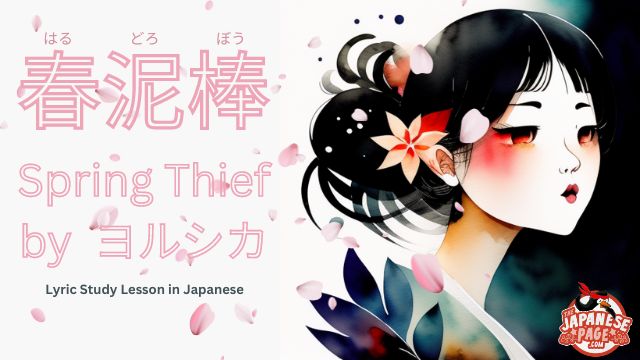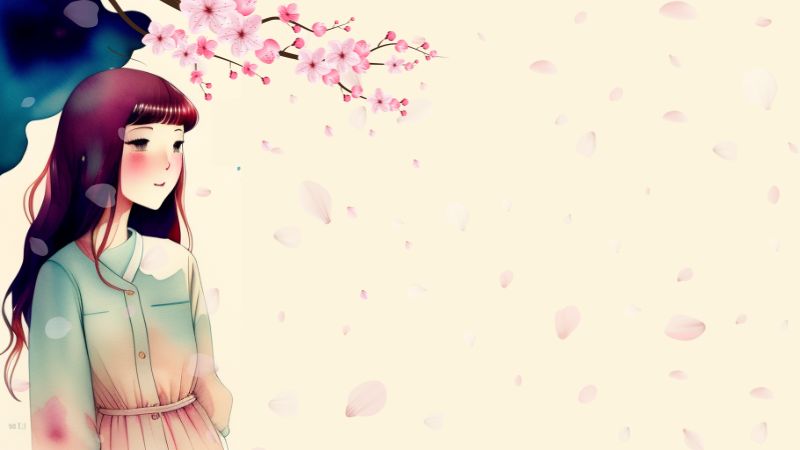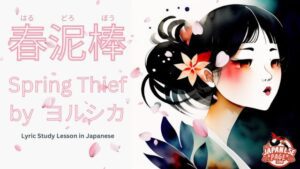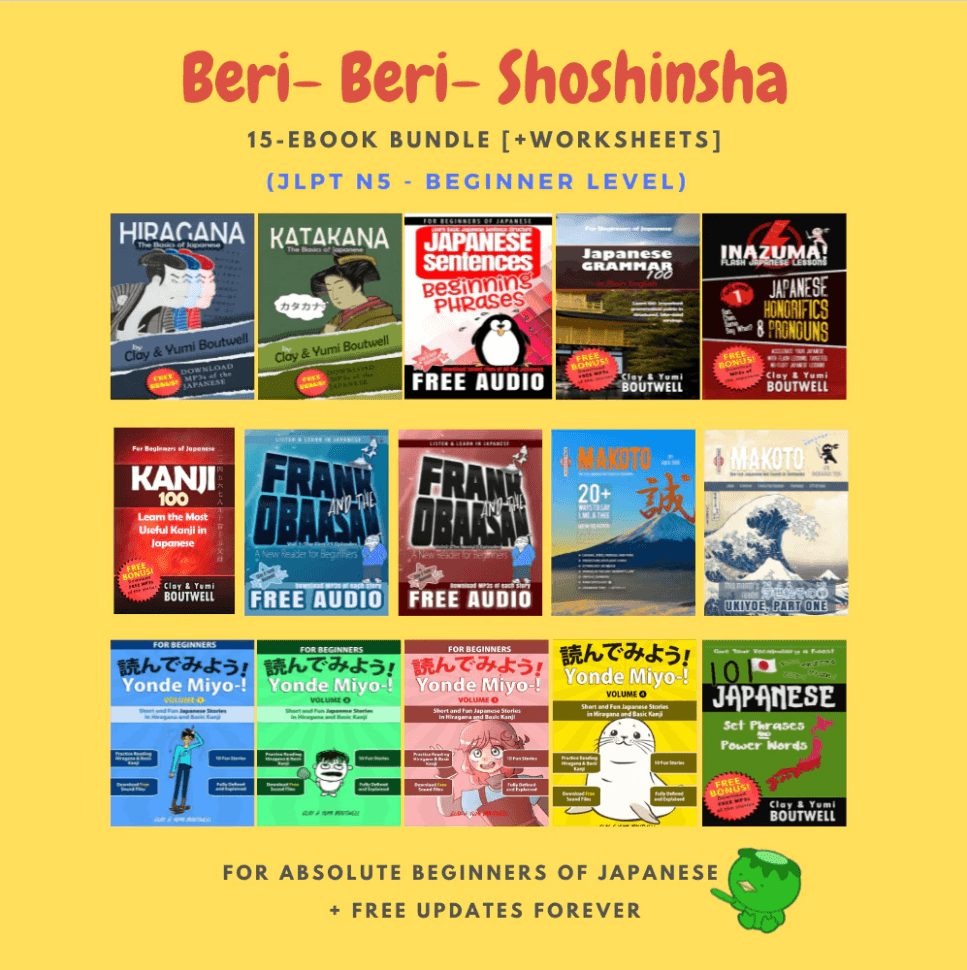

Special thanks to 札内 幸太 【ふだうち こうた】Kota Fudauchi for helping me go through the lines. See his blog for his latest.
This catchy song is the theme song for a recent Japanese drama called 「夕暮れに、手をつなぐ」 (hold hands at dusk | see here). For more lyric breakdowns, click here. Makoto+ members, please click here to download your bonus content (PDF, sound files, and an Anki deck with pitch accent diagrams and sound)

Introduction
About ヨルシカ
Today’s song is 春泥棒 by ヨルシカ. ヨルシカ is a rock duo comprised of N-buna (ナブナ - the composer and producer) and Suis (スイ) the female singer. They play pop, rock, and J-pop.
About the Song
The title of the song is 春泥棒 (Spring Thief). It’s about, well, the spring season, which the singer isn’t ready to let go of. Spring is often associated with new beginnings such as the start of school (in Japan), pleasant weather, and forming new friendships. However, just like the ephemeral sakura cherry blossoms, the season of spring is also short-lived.
The lyrics evoke thoughts of the sakura cherry blossoms without specifically mentioning the word “sakura”. Instead, the song refers to 花見 (flower viewing) and 春吹雪 (spring blizzard (of petals)). And one cannot think if “spring” in Japan without the cherry blossoms.
Although the poetic style leaves the meaning open to interpretation, there are themes of beauty and relationships and how time (represented by the wind) can come and take it all away.
N-buna, the writer of the song, said this about the idea behind the song.
「花が寿命なら風は時間だろう」
If the flower represent one’s lifespan, the wind (that blows the flower petals away) represents time.
https://ja.wikipedia.org/wiki/%E6%98%A5%E6%B3%A5%E6%A3%92
Words to Look For
As you go through the lyrics, be sure to look for repetition and variation. Here are a few phrases to look out for:
Early in the song and at the end, we encounter はらり which is onomatopoeic representing something falling gently, in this case, the flower petals. Later, we hear 晴れり (clear; sunny) and 散れり (scattered). The り ending isn’t quite right in modern Japanese, but it is probably there to echo the はらり that bookends the song. It could also be a play on the classical Japanese auxiliary verb ender り)
The other reoccurring word is 億劫. If you listen to the song, it’s the word the singer always vibrates on. This word means a reluctance to do something. It carries a nuance of having done something often in the past, but since one hasn’t done that act recently, one is having a hard time getting into the mood of doing it again.
Take this example from Tatoeba via Jisho.org.
休みが長過ぎると、仕事に戻るのがおっくうになる。
Too long a holiday makes one reluctant to start work again.
If you haven’t heard the song yet, give the video a watch before going through the lyrics.
Makoto+ Bonus Content
While this lesson is free, Makoto+ and Patreon supporters have access to bonus content including a downloadable PDF and sound files. If you are a member, please click here for the bonus content.
Please consider supporting us by becoming a member or patron!
Video of the Song
Sound File of the Lyrics
Here is a recording of all the lyrics spoken with pauses between lines. See below for breakdowns of every line with individual sound files.
Lyrics in Japanese with Furigana
Japanese Only Lyrics with Furigana
Line-by-Line with Vocabulary and Translation
Please note, in many cases, due to the poetic nature of songs, other translations are possible.
高架橋を抜けたら 雲の隙間に青が覗いた
Vocabulary & Notes
最近どうも暑いから ただ風が吹くのを待ってた
Vocabulary & Notes
木陰に座る
Vocabulary & Notes
何か頬に付く
Vocabulary & Notes
見上げれば頭上に咲いて散る
Vocabulary & Notes
はらり、僕らもう息も忘れて
Vocabulary & Notes
瞬きさえ億劫
Vocabulary & Notes
さぁ、今日さえ明日、過去に変わる
Vocabulary & Notes
ただ風を待つ
Vocabulary & Notes
だから僕らもう声も忘れて
Vocabulary & Notes
さよならさえ億劫
Vocabulary & Notes
ただ花が降るだけ 晴れり
Vocabulary & Notes
今、春吹雪
Vocabulary & Notes
次の日も待ち合わせ
Vocabulary & Notes
花見の客も少なくなった
Vocabulary & Notes
春の匂いはもう止む
Vocabulary & Notes
今年も夏が来るのか
Vocabulary & Notes
高架橋を抜けたら 道の先に君が覗いた
Vocabulary & Notes
残りはどれだけかな
Vocabulary & Notes
どれだけ春に会えるだろう
Vocabulary & Notes
川沿いの丘、木陰に座る
Vocabulary & Notes
また昨日と変わらず今日も咲く花に、
Vocabulary & Notes
僕らもう息も忘れて
Vocabulary & Notes
瞬きさえ億劫
Vocabulary & Notes
花散らせ今吹くこの嵐は
Vocabulary & Notes
まさに春泥棒
Vocabulary & Notes
風に今日ももう時が流れて
Vocabulary & Notes
立つことさえ億劫
Vocabulary & Notes
花の隙間に空、散れり
Vocabulary & Notes
まだ、春吹雪
Vocabulary & Notes
今日も会いに行く
Vocabulary & Notes
木陰に座る
Vocabulary & Notes
溜息を吐く
Vocabulary & Notes
花ももう終わる
Vocabulary & Notes
明日も会いに行く
Vocabulary & Notes
春がもう終わる
Vocabulary & Notes
名残るように時間が散っていく
Vocabulary & Notes
愛を歌えば言葉足らず
Vocabulary & Notes
踏む韻さえ億劫
Vocabulary & Notes
花開いた今を言葉如きが語れるものか
Vocabulary & Notes
はらり、僕らもう声も忘れて
Vocabulary & Notes
瞬きさえ億劫
Vocabulary & Notes
花見は僕らだけ
Vocabulary & Notes
散るなまだ、春吹雪
Vocabulary & Notes
あともう少しだけ
Vocabulary & Notes
もう数えられるだけ
Vocabulary & Notes
あと花二つだけ
Vocabulary & Notes
もう花一つだけ
Vocabulary & Notes
ただ葉が残るだけ、はらり
Vocabulary & Notes
今、春仕舞い
Vocabulary & Notes
Makoto+ members, click here to download your bonus content.
Not yet a member? Click here to learn more.
For upper beginners and above.
Want to improve your reading, vocabular, grammar, and listening skills by reading about yokai such as oni or kappas? We have the digital bundle for you.
Living in shadows and the in between worlds of dreams and reality, yokai thrive in Japanese imagination. Yokai are monsters, ghosts, unnatural beings, and even sentient household items. Yokai can be harmless and amusing, or they can be terrifying.
Includes free updates for life!







